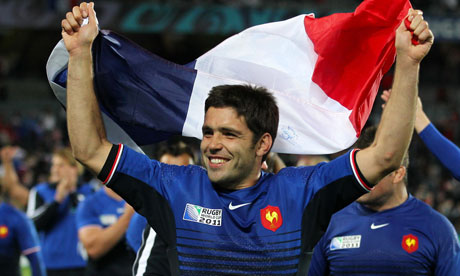
It's an odd feeling. In less controversial circumstances these notes would have been used preparing for a World Cup final.
After the quarter-final against Ireland, I sat down and started jotting down everything I knew about Graham Henry's 2011 All Blacks; how they play and how to play them. Most of the notes came from the New Zealand quarter-final against Argentina, who exposed a few nerves for 60 minutes, but the remainder were compulsive additions from the Australia semi-final when we already knew we were out of the competition and that the Wallabies would be our opposition for the third-place shoot-out.
Over the second batch of notes, and after a chat with some of the All Black coaches, has been added "claustrophobic intensity" – not a terribly catchy phrase I agree, but the line those coaches planted in their players' minds before they sent them out against Australia. It just about sums up what happened in the opening quarter of that Eden Park semi-final and I suspect Sunday's final is likely to go the same way.
The question is whether France can match the All Black intensity in a way Australia, a much more fluid side by nature, could not.
First though, you have to understand what the Blacks try to do to sides they suspect are not up to the physical challenge; not up to the remorseless grind of meeting them toe-to-toe at the set piece or accepting the punishment of colliding in the loose.
About a year ago at the Millennium Stadium, Wales were given a sample of what the Blacks were all about. They suspected we were not as fit as was needed and set about running our forwards – particularly the tight five – off their legs. When that was done and something close to exhaustion exposed, they then set about putting the points on the board.
However, it's the softening up that matters. We went away and got so fit we knew that, come the occasion, we could go 80 minutes with the Blacks without wilting. Whether France can, I doubt. Long before the end of our semi-final – 14 men against 15 for all but 17 minutes – France looked to be the ones who were wilting and the omens are less than bright for Sunday.
New Zealand go about their work in a methodical way. From lineout or scrum, it's basically the same. Play is taken across the field, probably as far as the 15-yard line and then back into centre field, where it's most difficult to defend. They may hit up once or twice, seeking to commit more defenders, but more importantly asking them to take the collision, make the tackle, get up and do it all over again. And again. And again.
Any professional sportsman can jog around for 80 minutes, but it's something else to be collision conditioned, as it's called. The captain and flanker Thierry Dusautoir can do it, as can William Servat, the hooker, but France are not exactly overburdened with jackals – those guys who not only tackle, but get over the breakdown, scavenging for the ball or making ball slow for the opposition.
The slack will have to be taken up by the rest of the tight five and, if they are to survive the pace and still do their jobs at scrum and lineout, then France have to take the pace out of the game. It will be a little like watching Biarritz in the Heineken Cup and the man at the centre of the action will be Dimitri Yachvili, the scrum-half who does the job for both club and country.
The Biarritz No9 will need to nurse his resources, so those trademark box kicks will be designed to roll, end‑over‑end, into touch. Whereas Wales wanted to keep the ball in play and demanded that kicks be run back, Yachvili will give his big men precious oxygen breaks by manoeuvring play along the touchline, his forwards walking to the lineout, much as they will to every scrum. You may even see one of the props drop to one knee when a scrum is due, just to extend the break a puff or two longer.
France will go for the full lineout and the complete array of five potential targets; New Zealand are more likely to call the occasional four-man line, because all they want is to get the ball back into play and force more and more midfield confrontations. It's attritional stuff, but backed up by the threat that guys such as Ma'a Nonu and Conrad Smith always offer.
In taking play back to that most dangerous of zones in midfield, New Zealand will probably put a playmaker to either side and then tell Nonu and his clever feet to ask questions of the tacklers. Because he goes left or right, that probably means two men looking after the centre when resources are at their most precious. Add the threats out wide and that of Israel Dagg returning kicks from deep and you can see France will have their hands full.
So can France hold back and beat this remorseless Black tide? Well they have done in the past: twice at Eden Park in their past nine visits. But they will have to repeat their performance of 2007 and that Cardiff quarter-final if they are to have a chance. France have to find half a dozen Dusautoirs and even then this All Black side are probably better than that of 2007. And they are at home.

